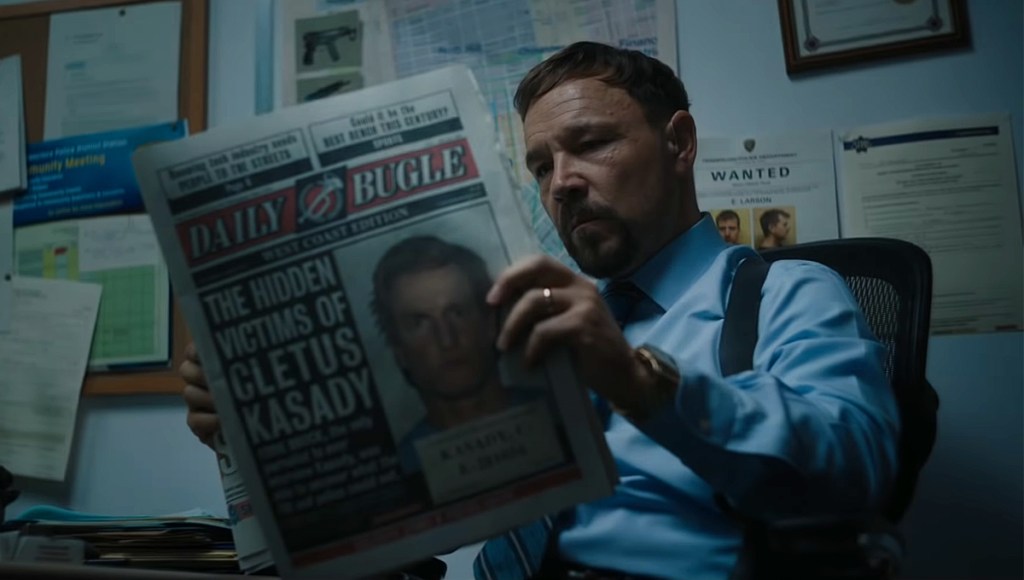The just-released debut trailer for sequel Venom: Let There Be Carnage will obviously leave fans fawning over the intense unveiling of Marvel Comics’ serial killer crimson symbiote himself, Carnage. However, it also happened to tease imagery that could end up becoming a consequential Easter egg for the canonical place of the upcoming film—and its 2018 predecessor—in the Marvel Cinematic Universe, and thusly, any presumed connection it might have had to Spider-Man.
The Venom: Let There Be Carnage trailer shows a police detective named Mulligan, played by Stephen Graham (Greyhound, Line of Duty), reading a paper that should be instantly recognizable even to those with only casual knowledge of Spider-Man lore: The Daily Bugle, the New York rag of Spider-Man-shading publisher J. Jonah Jameson, who unwittingly employs Spider-Man himself, Peter Parker. While a knee-jerk reaction might declare this image the long-awaited proof of Venom‘s Spider-Man connection, it actually proves the opposite, which might be a sobering revelation for MCU purists. Indeed, we need not speculate on this notion, since director Andy Serkis confirms to IGN that this Venom, or, at least Venom: Let There Be Carnage, is not operating in the MCU.
“We’re treating this very much as his own world. Venom’s story is his own world,” reveals Serkis. “There are nods and little moments just like this—newspaper the Daily Bugle—but on the whole, he’s unaware, they’re unaware at this point of other characters like Spider-Man. So, that’s the way we’ve chosen to play this particular episode of the movie.”

Indeed, Mulligan’s copy of the Daily Bugle—a prop that hints his own adversarial connection to Woody Harrelson’s eventual red symbiote recipient, incarcerated serial killer Cletus Kasady—is a traditional print newspaper, which immediately differentiates it from the MCU’s version. Of course, the Bugle’s surprise introduction in the MCU, in the post-credit scene of 2019’s Spider-Man: Far from Home, depicted it as a “controversial news website,” an InfoWars-esque, conspiracy-coveting website brandishing an old-fashioned .net domain, centered on the video rantings of a new, flattop-deprived version of Jameson, played by his portrayer in director Sam Raimi Spider-Man Trilogy, J.K. Simmons. Here, we saw Jameson run Mysterio’s posthumously-hoaxed story accusing Spider-Man of his murder, and also reveal his identity as Peter Parker. While one could have theorized that momentum from that scoop could have quickly propelled “TheDailyBugle.net” to transform into a thriving print paper, Serkis effectively nipped that notion in the bud.
The canon clarification mercifully eliminates the overall ambiguity in which the Venom franchise has been mired. The Sony Pictures-hailing films were seen as vexing when it came to the MCU’s canonical coherence for numerous reasons, notably because they kicked off a cold introduction to the eponymous A-list Spider-Man villain-turned-antihero with the 2018 Tom Hardy-starring solo film, which was set in San Francisco; nearly 3,000 miles from NYC’s never-mentioned Spider-Man. It was an approach that was seen by comic purists as egregious, since it ignored Venom’s traditional origin story in Marvel lore—and even Topher Grace’s divisive Spider-Man 3 version—was directly tied to Spidey, since he started out as Eddie Brock, a journalist for rival paper The Daily Globe, whose star-making scoop on the identity of psycopathic vigilante the Sin Eater was debunked by Spider-Man’s apprehension of the character, resulting in a downward spiral for his life and career that made him the perfect new host for the equally-bitter alien symbiote that Spidey rejected.
Read more
That, of course, is a far, Wall-Crawler-deprived, cry from the origin story established for Tom Hardy’s Eddie Brock in the 2018 side-franchise-launcher. Therefore, not having to worry about its lack of comic verisimilitude, the Venom franchise has been effectively relieved of the weight from its ambiguous canonical status, which was always the elephant in the room, especially as Tom Holland’s version of the Wall-Crawler continued to bask in MCU-adherent glory due to Sony’s historic deal with Marvel Studios. Thus, Venom is now proof positive that the studio was left to its own devices on the Spider-Man movie front.
However, that is not to say that Sony’s non-Spider-Man property spinoffs will be completely devoid of MCU connections. Lest we forget, the trailer for the studio’s next cold-into villain spinoff, the Jared Leto-headlined living vampire movie Morbius, directed by Daniel Espinosa, made a shot across the MCU bow with a scene in which the titular character walks by a poster of Spider-Man, which was defaced by a graffito of “murderer,” a direct reference to the aforementioned events of No Way Home. Moreover, Serkis’s MCU-debunking comments seemed carefully constructed, especially when he defined the film’s non-MCU approach to “this particular episode of the movie,” which leaves room for a prospective MCU retcon. He also teases of more prospective Spider-Man Easter eggs in the film, “Well, we’ll wait and see. We’ll see what little things you can pick out of it.” Indeed, if Sony’s long-mooted plans for a Sinister Six Spider-Man villain team-up ever comes to fruition, it will need to establish some kind of MCU, Spider-Man-related foothold in order to justify its existence.
Venom: Let There Be Carnage is headed to theaters on Friday, September 24.


